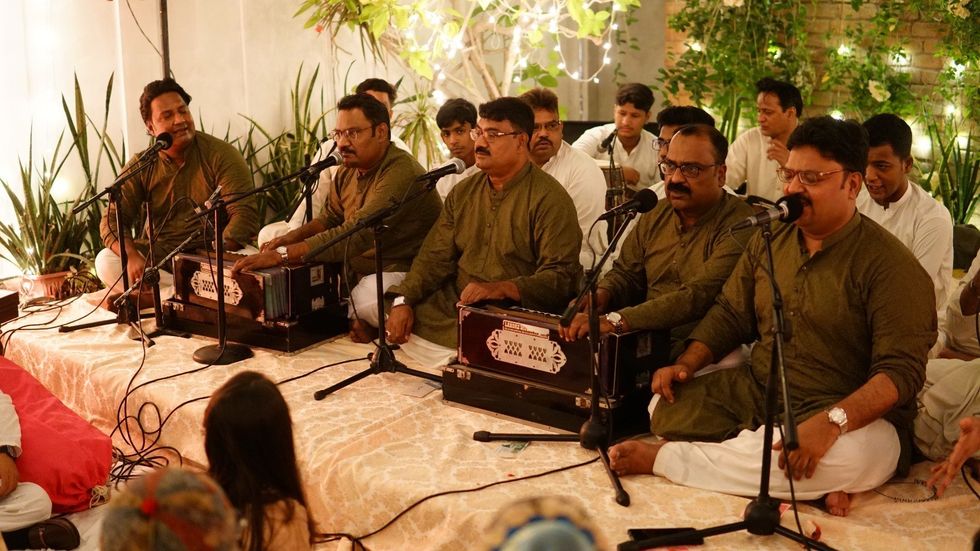INDIA's economic growth slowed much more than expected in the third quarter, hampered by weaker expansions in manufacturing and consumption, likely adding pressure on the central bank for interest rate cuts.
Gross domestic output in the world's fifth-biggest economy rose by 5.4 per cent in July-September year-on-year, data showed on Friday (29), the slowest pace in seven quarters and below a Reuters poll of 6.5 per cent. In the previous quarter it grew 6.7 per cent.
The gross value added (GVA), a more stable measure of economic activity, also saw a modest 5.6 per cent growth, easing from a 6.8 per cent increase in the previous quarter.
India's chief economic adviser V Anantha Nageswaran told reporters the growth figure was disappointing amid a challenging global environment.
"The bulk of the slowdown has been predominantly due to the manufacturing sector ... Some of it is also due to the presence of excess capacity elsewhere and imports dumping in India," he said, highlighting surging imports of cheap steel from China, Japan and South Korea.
The slowdown, visible across a number of sectors, was indeed most pronounced in manufacturing, where year-on-year growth dropped to 2.2 per cent compared with 7 per cent the previous quarter.
"The economy has hit a bump on its post-pandemic recovery path, with a much slower manufacturing sector and mining sector dragging down growth prospects," said Suman Chowdhury, chief economist at Acuite Ratings.
Economists say inflation, now running at around 6 per cent, is biting into demand for goods ranging from soaps to shampoos to cars, particularly in urban areas. Private consumer spending rose 6 per cent from a year earlier, compared with 7.4 per cent in the previous quarter.
The slowdown also came despite government spending rising 4.4 per cent year-on-year in July-September, compared with a 0.2 per cent contraction the previous quarter.
Helped by a good monsoon, agricultural output did better, rising 3.5 per cent compared from 2 per cent growth the previous quarter.
The government adviser said that growth prospects were still resilient and that rural demand would remain a supporting factor.
Third-quarter corporate earnings had hinted at a slowdown in the country.
More than 50 per cent of the 44 firms in the blue-chip Nifty 50 index that have reported earnings have either missed analysts' estimates or reported results in line with expectations, according to data compiled by LSEG.
FILE PHOTO: RBI Governor Shaktikanta Das. REUTERS/Francis Mascarenhas.Companies like Maruti Suzuki and FMCG giants Nestle India and Hindustan Unilever reported sluggish urban consumption in the September quarter.
Growth in inflation-adjusted wage costs for listed Indian firms - a proxy for the earnings of urban Indians - has remained below 2 per cent for all the three quarters of 2024, well below the 10-year average of 4.4 per cent, data from Citi showed.
Slower earnings growth prompted record foreign outflows of nearly $12 billion (£9.5bn) from the Indian equity markets in October.
Pressure on RBI
Bond yields and overnight index swap rates, seen as an indicator of interest rates, fell after the GDP release, signalling an increased probability of an interest rate cut in February.
A few economists, however, said the Reserve Bank of India (RBI) may even consider a rate cut in December.
"Post today's (GDP) print, there is a high probability of an RBI rate cut in December," said Gaura Sen Gupta, economist at Mumbai-based IDFC First Bank.
India's finance and trade ministers have called for lower interest rates to help industries to ramp up investments and build capacities, although Nageswaran kept his council when speaking to reporters.
"All of us see the data, the central bank is also seeing the data. They know what to do and I will be not commenting on this question," the government's chief economic adviser said.
The RBI's Monetary Policy Committee (MPC) left its benchmark repo rate unchanged at 6.50 per cent last month due to still high inflation, while tweaking its policy stance to "neutral".
The bank, which last cut rates in May 2020, announces its next policy decision on Dec. 6.
(Reuters)






 Them performing liveNajmuddin Saifuddin Qawwal Group
Them performing liveNajmuddin Saifuddin Qawwal Group









 Despite his growing profile, he has not previously worked on video game voice acting projectsYouTube/ IO Interactive
Despite his growing profile, he has not previously worked on video game voice acting projectsYouTube/ IO Interactive

The cast of Marriage Material in key moments from the play, including Avita Jay, Kiran Landa, Omar Malik, Irfan Shamji and Anoushka Deshmukh
Sathnam Sanghera’s 'Marriage Material' adapted into bold new play on conformity
The play Marriage Material at the Lyric Hammersmith Theatre is Gurpreet Kaur Bhatti’s adaptation of Sathnam Sanghera’s novel of the same name, which first came out in 2013.
She is lucky to have Iqbal Khan direct Marriage Material. The play, a co-production with the Birmingham Rep, is set in the late 1960s. Mr and Mrs Bains (played by Jaz Singh Deol and Avita Jay) run a corner shop in Wolverhampton. Their younger daughter, Surinder (Anoushka Deshmukh), is 16, her sister Kamaljit (Kiran Landa) is just a bit older.
They have a neighbour, Patwant Dhanda (Irfan Shamji), who, as we shall soon see, is not a very pleasant man. In fact, he comes across just as racist as Enoch Powell, who represented Wolverhampton South West for the Tories from 1950 to 1974.
It will be recalled this was a time when Sikhs working on the buses were told they couldn’t wear a turban. That was a hard-fought battle that had to be won.
The Bains, meanwhile, simply want to get their girls married off.
Nothing new here, I thought.
What makes the tale different is that the plot twists and turns down the generations. Mr Dhanda, who has the makings of a paedophile, makes a pitch for one of the girls when Mr Bains dies early in the play. “A life with no man in the house is no life,” he informs the newly widowed Mrs Bains.
Mr Dhanda has a wife but she has returned to India so he considers himself to be a free man.
Surinder’s English teacher from school, Miss Flanagan (Celeste Dodwell), who is also head of the fifth form, tells Mrs Bains about her daughter: “I don’t want to embarrass you, but she is bright. Ridiculously bright.”
She adds: “Mrs Bains, I think it would be a pity if Surinder didn’t stay on at school.” The initial response from Mrs Bains is not encouraging: “Too much education makes people’s brains get mixed up, they don’t sleep at night…”
But she is finally persuaded that Surinder should be allowed to stay on for a while longer before being married off.
Mr Bains was very old school. When Surinder confides she would one day like to be “a somebody”, he is amused that “my daughter wants to be a somebody”.
“Like you,” she tells her father.
Mr Bains consoles his daughter: “We will find a somebody for you to marry.”
At the point of a possible marriage, however, Surinder is sweet-talked by chocolate salesman Jim Wilson (Tommy Belshaw) into running away with him. They share a love of literature, and he calls her “Sue Bains”. But the relationship does not end well.
Once she has left, Surinder is written off as “dead” by her family. The story that is circulated is that she was only 16 when she was killed in a car crash. That’s better than to let on that she ran off with a white man.
By the time she is reconciled with her sister towards the end of the play, a great deal has changed. Kamaljit married Tanvir Banga (Omar Malik), a young man who helped out in the Bains’ corner shop. When the two sisters meet again, Tanvir has also died. But he and Kamaljit had a son, Arjan Banga (Jaz Singh Deol doubles up for this role after the death of Mr Bains). He has come home after his father’s death to help his mother who is still running the family corner shop.
Meanwhile, Mr Dhanda’s business has prospered. He now has a son, Ranjit Dhanda (the role is taken by Omar Malik after Tanvir’s death), and he is nearly as unpleasant as his father.
Arjan has an English fiancée, Claire (Celeste Dodwell). In London, Arjan worked as a creative director. But after deciding to stay in Wolverhampton to help his mother, he decides he cannot marry Claire because she is white. In other words, Asians are not free of racism, either. Happily, at the end, the couple are reconciled.
As for Surinder, she parted company with Jim Wilson after realising he was all talk, depended on her for money and had failed to earn a penny from his literary pretensions. She had prospered, though, as a hotel owner and had been transformed in time into a well-groomed businesswoman. After being tracked down by Arjan, she decides to return to her roots in Wolverhampton and help Kamaljit run the family corner shop. Perhaps 50 years had passed during the passage of the play.
Being subjected to racism turned some Asians into racists themselves. The word goreh (white person) is repeatedly spat out with venom. Maybe it is worth remembering the play’s audience isn’t exclusively Asian – white folk are watching as well. And maybe some of the toilet humour ridiculing white people, which always makes me cringe, could be cut out.
In Sanghera’s novel, there is a quote from Enoch Powell’s speech in November 1968: “The West Indian or Asian does not, by being born in England, become an Englishman. In law he becomes a United Kingdom citizen by birth; in fact, he is a west Indian or an Asian still... he will by the very nature of things have lost one country without gaining another, lost one nationality without acquiring a new one. Time is running out against us and them. With the lapse of a generation or so we shall at last have succeeded – to the benefit of nobody – in reproducing ‘in England’s green and pleasant land’ the haunting tragedy of the US.”
In Marriage Material, where the acting is marvellous (apart from Mr Dhanda’s Indian mannerisms and accent being overdone) we do travel across a couple of generations.
There is a scene when Tanvir rejects Mr Dhanda’s vision of creating a little Punjab in Wolverhampton.
Mr Dhanda wants to take over the Bains’ corner shop and is putting pressure on Tanvir to sign the papers. He says: “In this country, money is the path to freedom.”
“Sign, please,” he instructs Tanvir. “We must make sure our children learn to behave nicely, according to our rules.”
He insists: “We maintain our identity so we can be ourselves.”
Tanvir disagrees: “We can be us here. With the goreh.”
Dhanda warns him: “Then we will be inviting chaos.”
Tanvir’s comment is telling: “You sound like Enoch.”
Kamaljit, who is expecting a baby with her husband Tanvir, says: “I would like my child to grow up knowing the history of the Gurus and to read the Granth Sahib. And to love their culture.”
Tanvir tells his wife: “I would like my child to go to the finest schools, to cheer for England in the World Cup and eat Yorkshire pudding on a Sunday.”
Kamaljit sets out a dream that has perhaps come to pass with many third and fourth generation British Asians: “Maybe our child can do both.” Much, much later, in a throwback to the past, we learn of Surinder’s O-level results: “Biology A, Chemistry A, English Language A, English Literature A, French A, History B, Latin A, Mathematics A, Physics A…”
Kamaljit tells her younger sister: “Never mind about the B.”
And that is quintessentially Asian. Their acting is outstanding.
Marriage Material is at the Lyric Hammersmith Theatre until June 21, and at the Birmingham Rep from June 25-July 5